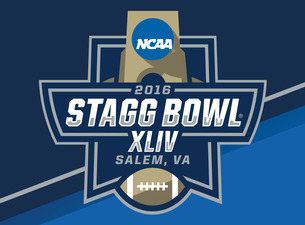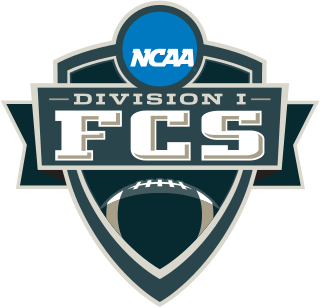The Camellia Bowl was an annual college football postseason game in Sacramento, California, which is nicknamed the Camellia City. It was held sixteen times at Hughes Stadium, from 1961 through 1975, and once more in 1980.
The NCAA Division II Football Championship is an American college football tournament played annually to determine a champion at the NCAA Division II level. It was first held in 1973, as a single-elimination playoff with eight teams. The tournament field has subsequently been expanded three times: to 16 teams in 1988, 24 teams in 2004, and 28 teams in 2016.

The NCAA Division III Football Championship is an American college football tournament played annually to determine a champion at the NCAA Division III level. It was first held in 1973, as a single-elimination playoff with eight teams. Over the past 50 seasons, the number of participants has grown to 32, with the current bracket size dating from 2005. In 2023, 28 playoff bids went to conference champions via automatic qualification, leaving just four places for at-large selections.

The NCAA Division I Football Championship is an annual post-season college football game, played since 2006, used to determine a national champion of the NCAA Division I Football Championship Subdivision (FCS). From 1978 to 2005, the game was known as the NCAA Division I-AA Football Championship.

The Grantland Rice Bowl was an annual college football bowl game held from 1964 through 1977. The game originated as an NCAA College Division regional final, then became a playoff game for Division II. It was named in honor of Grantland Rice, an early 20th century American sportswriter known for his elegant prose, and was originally played in his hometown of Murfreesboro, Tennessee.
The Pecan Bowl was the name of two college football bowl games played in two different eras. The initial version, in 1946 and 1947, was contested by historically black colleges and universities (HBCUs). The later version, held from 1964 through 1970, was an NCAA College Division regional final.

The 1978 NCAA Division I-AA football season was the first season of Division I-AA college football. Division I-AA was created in January 1978 when Division I was subdivided into Division I-A and Division I-AA for football only. It was anticipated that 65 Division I football schools would transition to Division I-AA. Instead, just eight programs voluntarily opted for Division I-AA for the 1978 season. They were joined by 35 schools that had reclassified from Division II.

The 1981 NCAA Division I-AA football season, part of college football in the United States organized by the National Collegiate Athletic Association at the Division I-AA level, began in August 1981 and concluded with the 1981 NCAA Division I-AA Football Championship Game on December 19, 1981, at Memorial Stadium in Wichita Falls, Texas. The Idaho State Bengals won their first I-AA championship, defeating the Eastern Kentucky Colonels in the Pioneer Bowl, 34−23.

The 1982 NCAA Division I-AA football season, part of college football in the United States organized by the National Collegiate Athletic Association at the Division I-AA level, began in August 1982 and concluded with the 1982 NCAA Division I-AA Football Championship Game on December 18, 1982, at Memorial Stadium in Wichita Falls, Texas. The Eastern Kentucky Colonels won their second I-AA championship, defeating the Delaware Fightin' Blue Hens in the Pioneer Bowl, 17−14.
The 1969 Pecan Bowl was a college football bowl game played between Drake Bulldogs and Arkansas State Indians at Memorial Stadium in Arlington, Texas. It was one of four regional finals in the NCAA College Division, which became Division II in 1973. The other three regional finals in 1969 were the Boardwalk, Grantland Rice, and Camellia bowls.
The 1973 NCAA Division II football season, part of college football in the United States organized by the National Collegiate Athletic Association at the Division II level. The season began in September and concluded with the Division II Championship on December 15 at Hughes Stadium in Sacramento, California. This was the first season for Division II football, which were formerly in the College Division in 1972 and prior.
The 1974 NCAA Division II football season, part of college football in the United States organized by the National Collegiate Athletic Association at the Division II level, began in September and concluded with the Division II Championship on December 14 at Hughes Stadium in Sacramento, California.
The 1975 NCAA Division II football season, part of college football in the United States organized by the National Collegiate Athletic Association at the Division II level, began in September and concluded with the Division II Championship on December 13 at Hughes Stadium in Sacramento, California.
The 1964 Tangerine Bowl was an American college football bowl game between the East Carolina Pirates and the UMass Redmen, played in Orlando, Florida.
The 1970 NCAA College Division football season was the 15th season of college football in the United States organized by the National Collegiate Athletic Association at the NCAA College Division level.
The 1971 NCAA College Division football season was the 16th season of college football in the United States organized by the National Collegiate Athletic Association at the NCAA College Division level.
The 1982 NCAA Division I-AA Football Championship Game was a postseason college football game between the Eastern Kentucky Colonels and the Delaware Fightin' Blue Hens. The game was played on December 18, 1982, at Memorial Stadium in Wichita Falls, Texas. The culminating game of the 1982 NCAA Division I-AA football season, it was won by Eastern Kentucky, 17–14.
The 1981 NCAA Division I-AA Football Championship Game was a postseason college football game between the Eastern Kentucky Colonels and the Idaho State Bengals. The game was played on December 19, 1981, at Memorial Stadium in Wichita Falls, Texas. The culminating game of the 1981 NCAA Division I-AA football season, it was won by Idaho State, 34–23.
The 1978 NCAA Division I-AA Football Championship Game was a postseason college football game between the Florida A&M Rattlers and the UMass Minutemen. The game was played on December 16, 1978, at Memorial Stadium in Wichita Falls, Texas. The culminating game of the 1978 NCAA Division I-AA football season, it was won by Florida A&M, 35–28.

NCAA Division II bowl games are American college football bowl games played annually among some of the highest-ranking NCAA Division II football teams not invited to participate in the NCAA Division II Football Championship playoffs. The games are officially recognized by the NCAA. They are held in December, and are most commonly scheduled on the first Saturday of the month, three weeks after the final games of the Division II football regular season.






